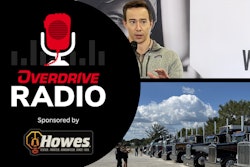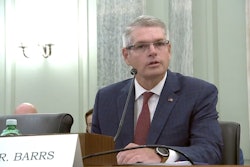The state of Washington, called out by DOT for not enforcing new English language proficiency rules and granting a full-term CDL to Harjinder Singh, has responded to the Federal Motor Carrier Safety Administration's recent demands.
The DOT in August called out Washington, New Mexico and California for not enforcing English language proficiency as an out-of-service criteria, after an FMCSA investigation.
Since then, New Mexico has begun enforcing the ELP regulation as an out-of-service violation, California has not, and now Washington has told Overdrive it plans to start by the end of October.
FMCSA gave those three states 30 days to come up with a plan to enforce ELP as an out-of-service violation for drivers, and has received responses from all three states by the September 25 deadline. Still, it's not certain if states will clear the bar and keep federal Motor Carrier Safety Assistance Program (MCSAP) funding.
FMCSA issued the three states a "Notice of Proposed Determination of Nonconformity" and pointed out the states hadn't put drivers out of service for ELP violations, and that they had failed to recognize driver OOS orders from other states. Washington inspectors interacted with four CMV drivers previously placed OOS by other states and allowed them to continue driving, FMCSA said.

[Related: Why state police are letting drivers placed OOS for English violations go free]
In Washington, set to get $10 million in MCSAP funds this year, the state's response to FMCSA acknowledges "our state risks losing significant funding based on claims the State Patrol is not 'performing in accordance with its approved Commercial Vehicle Safety Plan'" and "is not adequately meeting the qualifying conditions" for participation in the program.
Yet Washington disagrees: "It is unreasonable to find the state out of compliance when it is still working diligently to implement this abrupt policy change that the federal government announced just a few months ago." That's according to Washington's response to FMCSA.
FMCSA first put out guidance on ELP enforcement May 20, following it up with an official rule June 25.
Ultimately, Washington did say it made errors in its CMV enforcement and planned to correct them. FMCSA's notice to Washington "found six purported examples of Washington State inspectors not following the federal government's new guidance on how to ensure the English Language Proficiency of commercial drivers," the state wrote.
Washington's internal review found "only two of the six incidents actually presented issues of incorrect coding," which represents just .0002% "of the State Patrol's overall inspection volume and should fairly be considered against the thousands of contacts, inspections, and safety audits conducted each year."
But even two mistakes is two too many, Washington acknowledged, adding that the "State Patrol is committed to ongoing assessment and improvement, and even a small error can offer the opportunity to improve. To that end, we closely reviewed each of the incidents listed in the Notice."
The two mistakes the state verified came from inspectors coding ELP violations as having taken place with Mexican CDL holders in the U.S.-Mexico border zone, which does not carry an OOS penalty.
"Obviously, the State Patrol does not patrol the U.S.-Mexico border, Washington said, acknowledging that "inspectors used the incorrect code. We intend to address this issue of inaccurate coding through additional training to our personnel as part of the rollout of the new requirements."
[Related: FMCSA issues ELP-enforcement policy guidance for inspectors]
On the issue FMCSA raised of Washington's failure to "give full faith and credit" to previous OOS orders for non-English speaking drivers, Washington didn't quite know what to do about that.
"Without more information, we are not able to verify that these incidents occurred, or whether the inspectors acted appropriately," Washington wrote. "Still, we will continue to look for methods to make it easy and efficient for our inspectors to review previous inspection reports or violations."
New Mexico, similarly, described the federal government as giving little information on the charges of their inspectors letting ELP violators go free after a prior OOS ELP order written in another state.
On the less technical issue of simply not putting drivers OOS for lacking English, Washington said it would come around on that.
By "the end of October, all relevant State Patrol employees will have received training to ensure they follow the new federal guidance issued in June 2025. That includes making clear that when drivers are not English Language Proficient, inspectors should place them out of service," Washington wrote.
Washington's response to FMCSA seeks to put in perspective the CMV enforcement work it does by giving out some figures.
Washington's response states the "State Patrol employs around 250 people to ensure the safety of commercial vehicles on Washington's roads," and that on average, it's "responsible for 25,000 passenger vehicle contacts, 75,000 inspections, 1,400 safety audits, and 120 compliance reviews each year."
MCSAP funding "pays the salaries for about 25 percent of these employees," Washington wrote. "This is money well spent -- our employees have saved lives and improved traffic safety. Since 2021, the number of commercial vehicle fatality collisions in our state has dropped by approximately 19 percent."
Overdrive contacted FMCSA to see if Washington would keep its MCSAP funding and will update this story or write another if we get a response.
[Related: New Mexico releases video of Harjinder Singh passing an inspection in English]










